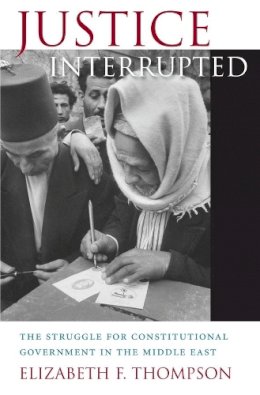
Justice Interrupted: The Struggle for Constitutional Government in the Middle East
Elizabeth F. Thompson
The Arab Spring uprisings of 2011 were often portrayed in the media as a dawn of democracy in the region. But the revolutionaries were—and saw themselves as—heirs to a centuries-long struggle for just government and the rule of law, a struggle obstructed by local elites as well as the interventions of foreign powers. Elizabeth F. Thompson uncovers the deep roots of liberal constitutionalism in the Middle East through the remarkable stories of those who fought against poverty, tyranny, and foreign rule.
Fascinating, sometimes quixotic personalities come to light: Tanyus Shahin, the Lebanese blacksmith who founded a peasant republic in 1858; Halide Edib, the feminist novelist who played a prominent role in the 1908 Ottoman constitutional revolution; Ali Shariati, the history professor who helped ignite the 1979 Iranian Revolution; Wael Ghonim, the Google executive who rallied Egyptians to Tahrir Square in 2011, and many more. Their memoirs, speeches, and letters chart the complex lineage of political idealism, reform, and violence that informs today’s Middle East.
Often depicted as inherently anti-democratic, Islam was integral to egalitarian movements that sought to correct imbalances of power and wealth wrought by the modern global economy—and by global war. Motivated by a memory of betrayal at the hands of the Great Powers after World War I and in the Cold War, today’s progressives assert a local tradition of liberal constitutionalism that has often been stifled but never extinguished.
Product Details
About Elizabeth F. Thompson
Reviews for Justice Interrupted: The Struggle for Constitutional Government in the Middle East
Thanassis Cambanis
Boston Globe
Thompson’s portraits are lively, accurate and informative—a highly readable primer for anyone seeking a deeper understanding of Middle Eastern political history.
Lawrence Rosen
Literary Review
[This] study on the rise of constitutionalism in the Middle East swiftly dispenses with the facile explanations of the Arab uprisings, instead offering readers a comprehensive yet nuanced look at the lasting impact of efforts to enshrine and institutionalize the language of justice across the region during the last two centuries.
Abdullah Al-Arian
H-Diplo
A major work by an eminent scholar of the Middle East, Justice Interrupted provides a panoramic view of the region’s struggle for justice and constitutional government over the past century and a half. Thompson offers powerful evidence that the pro-democratic aspirations of the Arab Spring have long roots.
Charles Kurzman, author of The Missing Martyrs: Why There Are So Few Muslim Terrorists Once again, Elizabeth Thompson delivers a first-rate book: original in approach, rich in content, yet readable in style. Rejecting superficial cultural stereotypes, Thompson articulates the importance of the common citizen and the social activist struggling for a more just society during a time of wrenching change. She is inspiring and brilliant, and I will recommend her new book enthusiastically.
Leila Tarazi Fawaz, author of An Occasion for War: Mount Lebanon and Damascus in 1860 Thompson boldly tackles some of the thorniest issues in the making of the modern Middle East—constitutionalism, freedom, democracy, visions of justice from across the political spectrum—and lucidly demonstrates how they have been experienced and contested by a broad range of social actors. An urgent and accessible history of ‘ideas in action,’ Justice Interrupted is essential reading for anyone interested in the past, present and possible futures of the entire region.
Max Weiss, author of In the Shadow of Sectarianism: Law, Shi’ism, and the Making of Modern Lebanon
